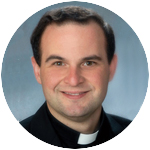
Father Eric J. Banecker
Recently, I had the great joy of leading a group of pilgrims from Philadelphia and the surrounding area to Italy. Along the way, we encountered the great saints like Catherine of Siena, Francis and Clare of Assisi, and, of course, Peter, Paul, and the many Roman pontiffs and martyrs. We also ate copious amounts of gelato and pasta – along with the occasional glass of chianti.
On the flight home, I marveled at the age we live in. A journey from the Delaware River to the Tiber River even 100 years ago involved a major, months-long trek which few could ever afford. Today, many people of even somewhat limited means are able to save up and undertake such a journey – and arrive in less than a day!
Of course, we must not forget that the reasons for this are entangled in the complicated webs of modernity. Contemporary air travel exists because of the military-industrial complex and global economic interests. As Catholics, we should hold both at arm’s length, recalling both the destruction caused from the air during wars of the last 100 years and the social devastation caused by our soul-crushing obsession with financial growth at the expense of spiritual growth.
Saint Paul offers us a word of caution and consolation in this regard: “I tell you, brothers, the time is running out. From now on, let those having wives act as not having them, those weeping as not weeping, those rejoicing as not rejoicing, those buying as not owning, those using the world as not using it fully. For the world in its present form is passing away” (1 Cor 7:29-31).
This passing-away world – the world of transactions, litigation, envy, and power differentials – is giving way even now to the new heavens and new earth promised in the Book of Revelation. Of course, only a Christian looking with the supernatural vision of faith can see this. To most other people, the world gets “worse” or “better” depending on one’s preferred ideology. But only a Christian can sense – even amid much confusion – the goal and destiny of the human race, and the mysterious ways God has accomplished his work of salvation from the first moment of creation to this moment.
Therefore, we as Catholics can make use of this world’s goods insofar as they help us achieve the goal of our lives – which is eternal happiness. What is corrosive of these ends, we must put aside. This requires the gift of discernment to see the world clearly, to judge what is conducive or destructive of our final end, and then to have the courage to act in accord with our judgment. For some, this may mean getting rid of a smartphone – or, at the very least, no longer investing in companies who make use of abusive labor practices to make them. For others, it may mean accepting a job with a lower salary but more time to spend caring for one’s family or an ageing loved one. It requires a real examination of conscience – true honesty with ourselves, seeing us as God sees us – to evaluate whether some material good is actually good for me, my family, my parish, or my community.
One moment that stands out from the trip was sitting with my dad outside of Saint Peter’s Square while my mom was in the gift shop (a common theme). In the course of those ten minutes of rest, several groups of people came over to ask me for a blessing: holy water, items they had just purchased in the gift shop. In one case, a couple married in a very small pandemic ceremony asked to have their rings blessed. It was remarkable to see the faith of such people expressed in their willingness to ask a priest they didn’t know from a country far away for a blessing (including in languages that priest doesn’t speak particularly well!).
There, literally on top of the rock upon which Christ built his Church, one could see the beauty and universality of the Church anew. One could see divine providence at work in the fact that humble pilgrims from around the world could experience this encounter with Christ thanks to airplanes that others use for destructive ends. I only pray that this pilgrimage of faith – undertaken not just with my group but in a mysterious way with these many other people – will have real effect in our lives moving forward. The fruit of this encounter with God, who is glorified in his saints and wonderful in his works, will be measured in our willingness to invest our time, energy, and earthly goods into the people and (local) communities the Lord has placed in our lives.
***
Father Eric J. Banecker is pastor of St. Francis de Sales Parish, Philadelphia.
PREVIOUS: Planned gifts ensure your legacy, and Catholic values
NEXT: No Learning Loss in Catholic Schools


Share this story